#morwen of gondor's husband
Text
Favourite Female Tolkien Character Poll - Round 1, Match 27
Morwen Steelsheen
The mother of Théoden, and of two daughters (one older than him and one younger). She was from Lossarnach in Gondor, and was seventeen years younger than her husband Thengel.
Éowyn was slender and tall, with a grace and pride that came to her out of the South from Morwen of Lossarnach, whom the Rohirrim had called Steelsheen.
Théodwyn
The youngest daughter of Morwen Steelsheen and Thengel, Théodwyn was the mother of Éomer and Éowyn; she died of illness when they were children, not long after her husband Éomund was killed in battle.
#favourite female tolkien character poll#morwen steelsheen#theodwyn#rohan#rohirrim#tolkien#the lord of the rings
9 notes
·
View notes
Text
cressida-jayoungr replied to this post:
My headcanon is the Stewards are descended from Elros through the younger daughter of some king who had more than one. So they wouldn't have a claim under either set of inheritance rules. (I think at one point, I pegged a likely candidate, but I forget now who it was. I don't even remember whether it was a king of Numenor or of Gondor.)
I think descent through a daughter (or multiple daughters, given the enormous length of time and limited population) is definitely the most natural explanation. Descent through one or more princesses could definitely convey the kind of Elrosian prestige the family seems to have had even before the Ruling Stewardship, without transmitting a claim to the throne with it.
It also adds an interesting dimension to Pelendur's part in barring descendants through the female line from the throne, if he himself is also a descendant in the female line. And young Boromir's frustration that their family is barred from the throne isn't that hard to understand, but it's still easier with the realization that they haven't just ruled the country for nearly 1000 years, but are also descendants of Elendil and Elros, anyway.
My personal headcanon conflates the draft where the Stewards are descendants of a Sindarin-speaking Faithful family back on Númenor, and the repeated references to their royal origin. I also felt the Faithful-royal origin version would have to split off early in the royal family's history (well before the house of Andúnië did, to keep the Stewards' ancestors lower in the succession), so I went with Princess Tindómiel, daughter of Elros, whom I've always been intrigued by.
I imagined she and her husband founded a powerful noble house that later ended up closely allied with their still greater neighbors in Andúnië. One of Tindómiel's distant heirs managed to escape Númenor, fought on Isildur's behalf, and was given Emyn Arnen. Between then and Húrin of Emyn Arnen's time, it seems likely enough that a princess or two of the line of Anárion could have intermarried with a family like that, explaining the additional references to them being descended from Anárion without being formally of the line of Elendil.
So they end up with a lot of prestige through these women (and then, after Mardil's time, through Rían and Morwen), and their kinship to King Minardil is near enough for him to acknowledge it, but they have no legal basis for a royal claim.
#this is actually the much simplified version of my headcanon#i am what i am!#cressida jayoungr#respuestas#legendarium blogging#long post#anghraine's headcanon#anghraine babbles#húrinionath#tindómiel#pelendur
13 notes
·
View notes
Text
Elfwine Chronicles (new LoTR stories, Manners, ch 2 posted, 3-4-23)
Morwen is irked by a persistent suitor, who isn’t at all what she has in mind for a husband. (Romance, Drama, Family)
Manners - Chapter 2
Morwen had been home from Minas Tirith for three days. Though she could have done without the tedious journey between cities, she had thoroughly enjoyed visiting Gondor. Well, except for that awful man.
By Gondorian standards, Edoras was still on the provincial side, and she loved the glamour and excitement afforded by a place such as Minas Tirith. There were more interesting shops, more things to do and she always enjoyed spending time with her relatives in that part of Middle-earth.
Perhaps one day she would move there, even marry a man from Gondor. With one notable exception, the men she had met there were far more sophisticated and appealing than those of the nobility in Edoras. True, she would not like being so far away from her family, but sometimes sacrifices had to be made. She was certain she would marry well, and they would be able to visit home often even if her husband was from Gondor.
Rising, she meandered toward her parents' chamber. She found her mother putting away clean clothes, and she sprawled on her stomach across their bed as she watched silently for a moment.
After several moments of observation, she announced, “I want my marriage to be like yours.”
Her mother turned to eye her questioningly. “What, in particular, do you mean?”
“Oh, everything. I want us to laugh and tease each other like you and Papa do. I never want us to stop holding hands and kissing and being romantic. I want us never to argue or disagree. That sort of thing.”
Lothiriel placed the last few shirts in a drawer, and then stepped over to sit down beside her daughter. “Those things do not just happen by themselves. Do you know why our marriage is like that?”
Morwen rolled over on her back to gaze thoughtfully at her mother, finally answering, “No, I suppose I do not.”
“We hold hands and kiss and are still romantic because we love each other, today just as much as when we were married. And we make a point of letting the other person know that we still feel that way. We laugh and tease each other because we trust the other person not to do it mean-spiritedly, and we are certain of their love for us. We learned how to laugh and tease together before we ever married and it has simply continued on.”
“All of the things you have mentioned as admiring do not come by chance. We choose for them to be that way, and put our effort into making them so. Our only thought is for the other person’s happiness, and we are willing to sacrifice to accomplish it. We choose not to be selfish, whenever possible. If you would have a similar marriage, you and your husband would have to make that same commitment to each other. What you see does not come without a cost,” Lothiriel told her.
Lothiriel paused there and considered the final point her daughter had made. At length, she added, “We do argue and disagree, but not often. And it does not last long because we do not wish it to. We look to compromise, we make an effort to work things out in a manner we both can live with. We agree on so much because we choose to agree. We choose to end arguments by giving in. We believe it is more important to give in than to insist on being right.”
She paused a moment, then added softly, “Your father is a man used to coming out the victor in any conflict, and one would expect him to be the same in arguments. Perhaps he is in politics, but it is humbling to me to know that he loves me so much, he would rather yield to my wishes than make me unhappy. He would rather lose the argument than lose me. And because he loves me that much, I dare not trample on his feelings and treat them callously. Even when I win the argument, I try to make him feel as though he shares in my victory, for I have no desire to best him. I would sacrifice all things to keep him at my side, even my own happiness, because he is what gives me my greatest happiness. That would be lost if he was lost to me, and I could never recover from it.”
Morwen considered what her mother had said, then commented, “You make it look so easy, yet it sounds so difficult.”
Lothiriel rose and leaned over to press a kiss to her daughter’s brow. “Not if you let your heart choose your actions, instead of your pride.”
As Lothiriel exited the room, Morwen contemplated her words. Surely there was another man such as her father, with whom she could have a similar marriage. Unbidden, the image of Caranhir came to mind and she gave a smirk. She doubted very much he would ever be that kind of husband! He would likely be domineering and bossy, always insisting everything was done his way! Yet another reason to reject him!
She gave a frustrated moan; why was she even thinking about that terrible troll? She was free of him now, and would never see him again. She didn't care who he married, so long as it wasn't her! Rising with determination, she forced him from her thoughts and returned to her own room to finish a tunic she had been working on.
No matter what, it was good to be home.
continue reading on AO3:
https://archiveofourown.org/works/45436576/chapters/114479491
#Eomer#Lothiriel#Lord of the Rings#Elfwine Chronicles#LOTR#Morwen daughter of Eomer & Original Male Character#Original Gondor Characters#Elfwine#Theomund#Dariel
1 note
·
View note
Photo
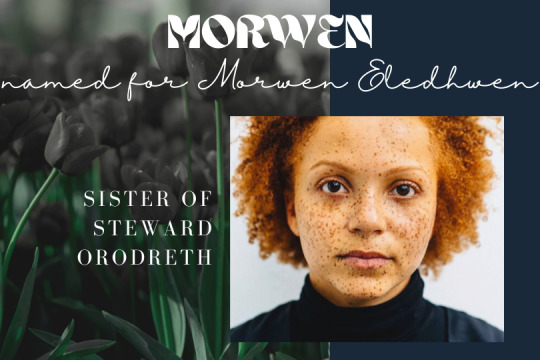




the line of elros ❖ stewards of gondor ❖ headcanon disclaimer
Morwen was the sister of Steward Orodreth and the grandmother of Steward Egalmoth. She was a sculptor, close friends with her law-sister Beleth, and through Beleth’s affiliation with the artists of Minas Tirith she met the jewelsmith Dammoron. Though her father Belecthor I at first disapproved of Dammoron courting his daughter, the two were eventually wed in a grand and happy ceremony.
Dammoron and Morwen had but one child, who from an early age expressed her true nature as a girl rather than the boy she had been mistaken for at birth. Though at that time Gondor was strict in its adherence to gender roles, Morwen and Dammoron supported their daughter, who chose the name Adanel after the wise-woman of ancient times. When Minas Tirith grew too suffocating, they removed to Lossarnach where Adanel was free to be herself without the expectations placed upon her by those who had known her since birth.
Adanel grew in wisdom and courage, and soon was wed to her sweetheart Faeleth, a woman of Lossarnach. When it became clear that Steward Ecthelion I would take no wife of his own, he reached out to his cousin Adanel and they began a friendship through letters.
Like Adanel, Ecthelion felt trapped in the expectations placed upon him in Minas Tirith, but unlike her could not flee for he was the Steward’s heir. Adanel commiserated with him, and when Faeleth bore her a son, Egalmoth, she promised that she would raise him to become Ecthelion’s heir so that he need not worry about finding a wife he could not love.
#tolkienedit#oneringnet#silm#silmarillion#lotr#gondor#morwen of gondor#morwen of gondor's husband#oc dammoron#oc adanel of gondor#oc faeleth#egalmoth of gondor#my edit#my writing#edit writing#headcanons#tefain nin#line of elros#stewards of gondor#egalmoth of gondor's parents
26 notes
·
View notes
Text
I’m home alone and bored so I’ve revamped my next-gen HCs for the houses of Húrin/Telcontar/Eorl mk. 2/Dol Amroth.
Húrin:
Faramir and Éowyn are first to produce an heir because they are nothing if not efficient.
They have twins: Elboron and Théodwyn (I like the name less and less with each passing day—also not sold on Morwen, am considering a swap to Andreth or Saelind for ~reasons~)
The twins are born in FO 1, three years after the end of the war, two years after Faramir and Éowyn are married
They’re each very much like their parents: Elboron inherits his father’s proclivity for melodrama and his mother’s sense of duty, Théodwyn his love of learning and her never-take-no-for-an-answer attitude.
Elboron inherits Éowyn’s blonde hair, Théodwyn Faramir’s black, both are taller than Éowyn (who, I should remind everyone, is not short) by the time they’re sixteen. Éowyn makes out that she’s furious about it, but secretly loves it
Both have a slightly reduced turbo-charged Númenórean vibe, but it’s still very much there. It’s more obvious with Théodwyn because she leans into it more aggressively, Elboron, by contrast, likes that people still think he’s ~exotic~ for looking more Rohirric, so tries to play that up. He grows into embracing it later in life.
Théodwyn hauls ass out to Harad the first chance she gets—it’s a Whole Thing for the family, but Éowyn’s already quite sensitive to not making her kids feel trapped, and Faramir’s quite content to get as many people as possible in on his anti-war crusade, so he does eventually get over his panic at her going.
She meets her future husband there, though it takes them several years to seal the deal. They have a quieter sort of courtship, Théodwyn has no interest in being compared to her parents, and feels like she finds a kindred spirit in Bijan in terms of the balance of practicality vs individuality.
After they marry (in Harad, again, it’s a Whole Thing), they return to Ithilien for a time, and then move to Minas Tirith so they can each play politics
Elboron, meanwhile, goes out on one of Aragorn’s imperial wars (to Rhûn, imo), expecting he’ll love it, only to discover that, ah, yes, his parents were in fact right about war sucking ass.
He immediately begs for—and is given—a semi-diplomatic position in the Northern Kingdom.
He falls in love and has it bad for one of the daughters of the Rangers of the North. He, à la pops, plays up the drama 100%, and Ilmarë loves it, because she feels like Gondor is so trendy and established and that the Northern Kingdom doesn’t have the same pizzazz.
They marry in Ithilien but immediately return to the North for a few years; a few of their children are born in the North.
Telcontar:
I think, as is the fanon standard, there are three daughters born to Aragorn and Arwen before Eldarion comes along.
The first daughter, Míriel, is born Summer 3020. Second and third are born quickly thereafter, Arwen is basically pregnant constantly between Autumn 3019 and FO 5.
This complicates things re: her father leaving M-E. There’s drama.
Eldarion is born Spring FO 3, and then A+A’s last daughter and then second son, (named Fintherion) are born three and five years after that. RIP to Arwen’s pelvic floor.
There’s a lot of outside pressure on Míriel and Elboron to get married, even from their youngest years, but their parents are incredibly hardline on not letting that happen—Míriel takes a broad Fuck Marriage position, whereas Elboron takes the far more politically-aware approach of “even if I did (I don’t), someone would murder one of us if that marriage was attempted, it’s too much concentrated power”.
They still end up as quite close friends, and egg on each others’ penchant for melodrama, which is cute when they’re kids, but starts to get them in trouble when they’re older.
Eldarion grows up like Emma Woodhouse, spoiled but extremely charming and clever. He has the entire Emma plot line with one of Éomer and Lothíriel’s daughters, and they’re married basically without a hitch.
Unnamed Daughter #2 marries Bard II of Dale—this is mostly a political thing; Unnamed Daughter #3 very astutely marries one of the sons of a lord of Gondor (I’m thinking Lebennin); Fintherion doesn’t marry; Unnamed Daughter #4 marries a northern lord (sort of political sort of not, she just wants to get the fuck out of Gondor)
The kids generally end up in this weird social space when they’re growing up where their closet pals end up being Éomer and Lothíriel’s kids and the kids of other various lords who set up camp in Minas Tirith. The Húrinionath are sort of isolationists in Ithilien because of how much work there is to do there and because Arwen and Aragorn end up quite difficult to socialise with.
Eorl mark 2
Éomer and Lothíriel marry in TA 3021—this is a semi-arranged political marriage. Éomer doesn’t give a shit one way or the other about marriage, Lothíriel has been raised to see marriage as an important political tool, so is earnestly only interested in it in that regard.
They, like Aragorn and Arwen, go through a lot of daughters before they get to Elfwine.
Their first daughter is born FO 1, then there’s a gap until the next daughter is born in FO 3. Then there’s one daughter a year until Elfwine is born in FO 8. There are no more children after that.
It’s daughter number three that marries Eldarion.
The kids are raised in both the language of the Mark and Sindarin. Lothíriel ends up compared with some frequency to Morwen Steelsheen, though never earns an epithet of her own.
The kids actually don’t spend an enormous amount of time at Dol Amroth—given that Éomer is the king and therefore wildly outranks Imrahil (and later Elphir), it’s the Dol Amroth brood who have to visit them. They routinely split the difference and just meet in Minas Tirith, EXCEPT when Éomer goes off to war while the kids are still young, then the older kids are sent to Dol Amroth while the younger kids remain in Edoras with Lothíriel
To Lothíriel’s chagrin (and Éomer’s delight) the kids mostly marry within the Mark, bar daughter #3 who marries Eldarion.
Clan Dol Amroth
They do their very best to stay the fuck away from the northern families. The Hurinionath spend a decent amount of time in Dol Amroth when they can, but there’s no attempts to marry any of them off to one another—or of making that bargain with Aragorn and Arwen’s kids.
Imrahil does try. Éowyn occasionally helps (vis a vis Aragorn’s kids) because she’s a shameless shit-stirrer.
Alphros has two younger brothers born after the war, no sisters
Erchirion never marries, plays Did You Know I’m A War Hero for life, to great success. Spends a lot of time at sea, likes showing up in Edoras or Emyn Arnen unannounced with things to rile up the kids.
Amrothos marries the daughter of a Belfalan vassal lord. He’s gay, she’s gay, it works out great for them. They spend a lot of time travelling together—of all of the folks mentioned, they’re the ones that get to take the fullest advantage of the Reunited Kingdom. They go from Mithlond to Dale and Near Harad and have a grand old time of it.
#e writes#im so sorry for this im just so bored#hc#e hc#Húrin#telcontar#eorl#Éowyn#Faramir#elboron#isilmë#eldarion#elfwine
13 notes
·
View notes
Text
@morwenfairaself @thecrowngift
Those cousins are the only ones that were there for him that moment. He remembered that he was tired of the problems of the world that day and he needed to be with them all the time because he loved Morwen and Rian. They were together that moment and this was the only thing that mattered to him.
They were so sweet and kind to him all the time. He loved his friends too much. He could not imagine his life without them. He was the only one who could talk to them while there husbands were fighting for Gondor. They needed help, they needed comfort that moment.
Vorondil was wondering what he could do to help them out. But he spoke with them about the innocent times when they could travel far and wide and discover new lands on. He did not mention about hunting because he knew how much Rian hated hunting.
9 notes
·
View notes
Photo


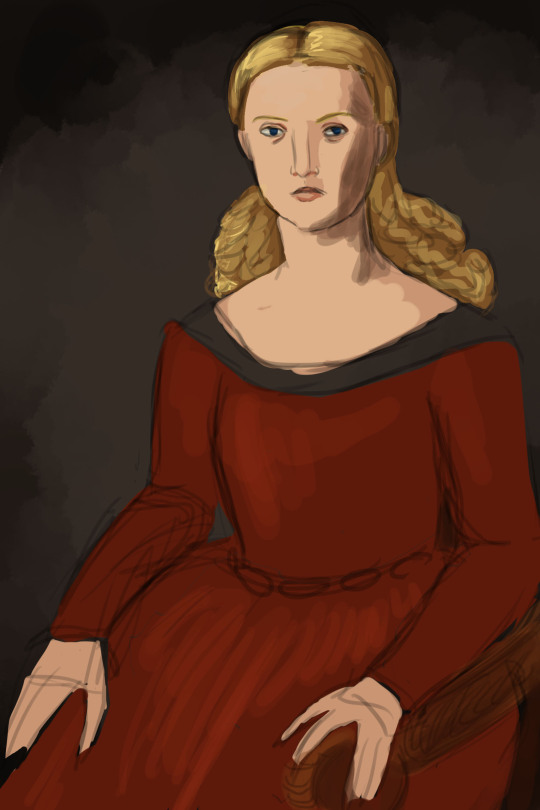
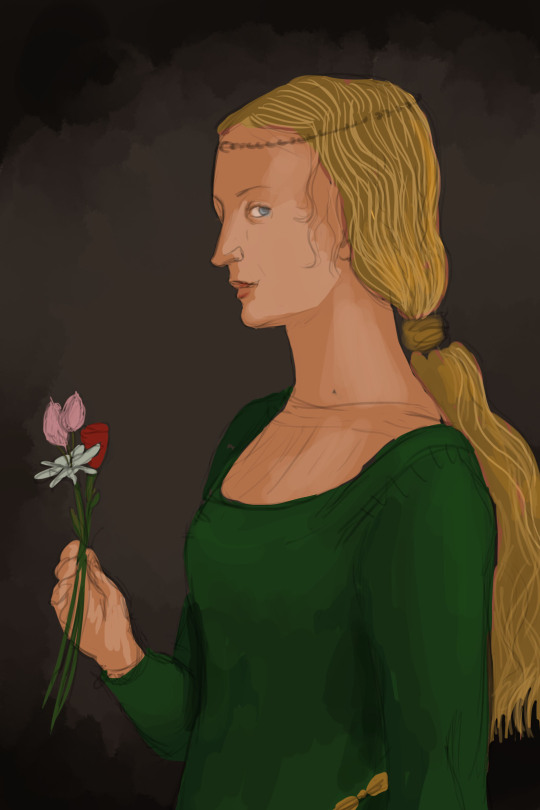
WIP alert! Portraits of Morwen’s daughters, commissioned by the Queen of Rohan upon their 20th birthdays so she can send copies to Gondor and maybe get her daughters some Gondorian husbands
Morneth, b. winter 2953. Bookish, patient, stern, and solitary.
Cynwise, b. spring 2955. A sharp tongue, a passionate temper, and a snarky sense of humor.
Forodiel, b. autumn 2961. Sharp-tongued, perceptive, creative, and bipolar.
Théodwyn, b. summer 2963. Gentle, clever, and generally cheerful, but prone to depression.
60 notes
·
View notes
Photo




Melian
The Queen (Tóril)
Earlier names: Gwenniel, Gwenethlin, Gwendeling, Gwendelin
Melian, who served both Vána and Estë while in Valinor, was associated with songbirds (particularly nightingales) and forests and was said to be very similar to Yavanna. Her name is Sindarian and means Dear Gift or Gift of Love; her Quenya name is Melyanna. She tended the trees in the gardens of Lórien and when she sang during the mingling of lights of the Two Trees even the Valar themselves would stop to listen to her. Like Oromë, Yavanna, and Ulmo, Melian was unable to completely abandon the rest of Arda when the Valar first retweeted to Aman, and she came often to the forests of Middle-earth because she loved the shadows of the trees. When the elves first awoke in Cuiviénen she came to Middle-earth and filled its silence with her singing and that of her nightingales.
She eventually met the elf Elwë in the forest of Nan Elmoth and they fell in love, standing motionless for many years. This resulted in some of the Telerin elves who were journeying to Valinor remaining behind to search for him. After they recovered from their trance, Melian and Elwë gathered his remaining followers who had become known as the Eglath (The Forsaken) and founded the kingdom of Eglador, the first true elven kingdom in Middle-earth. These elves later became known as the Sindar (Grey Elves or Elves of Twilight) because they originally had left for Valinor and thus weren't considered Dark Elves, but since they didn't reach Valinor they weren't considered Light Elves either. Melian later protected this kingdom from evil with a powerful enchantment of confusing mists around it, leading the kingdom to be renamed Doriath, which means Land of the Fence. Her husband later became known as Thingol, and while he had originally desired to see the light of Valinor again, it is said that he was content with the light he saw in Melian's face. They would later have a daughter named Lúthien, making Melian the only Ainu (excluding some characters like Ungoliant whose status isn't clear) who has any children in Tolkien's published Silmarillion. In Tolkien's earlier works many of the Valar had children; some of these (like Nieliqui and Telimektar) were dropped, some of them (Ilmarë, Salmar, Eönwë) became the Maiar, and a few (such as Vána) became younger siblings of a Vala that had originally been their parent. But while some of the Valar had children (Valarindi) in Tolkien's earlier drafts, Melian has always been the only one who ever coupled with a non-Ainur being.
Melian was a wise and caring queen who tried to protect her own family and people as much as possible. She also aided outsiders against darkness, providing assistance to Turin and his mother and sister, and lifting the spell of Morgoth from Hurin. She also aided the elf Beleg Cuthalion in his quest for Turin, and was a strong friend and mentor to Galadriel. Galadriel's daughter Celebrían would eventually marry Elrond, one of Melian's descendants, and their daughter Arwen would go on to wed Aragorn, another descendant of Melian. She accurately predicted that someone with a powerful fate would be able to pass through her enchantments, and she advised Thingol not to send Beren on a quest for a Silmaril when he arrived as foretold. In the early, more peaceful years (the time during which Melkor was captive in Valinor) of their kingdom when their people were more scattered and mobile, Melian foresaw that war would come and pushed Thingol to establish a stronghold for their people. They partnered with the Dwarves of Belegost, who were friends with the elves, to build the city of Menegroth, the Thousand Caves. After the murder of her husband by the more greedy dwarves of Nogrod, she briefly visited Beren and Lúthien to warn them of the dwarves' treachery and other things before she departed back to Valinor. There she dwelt again in the gardens of Lórien from which she had come, reflecting on her sorrows.
Melian has a strong connection to many of the major characters in The Lord of the Rings trilogy. Celeborn, Galadriel's husband, is a relative of Melian's husband Thingol. Oropher, the grandfather of Legolas, was an inhabitant of Melian's realm. Through her great-granddaughter Elwing she is an ancestor of Arwen through Arwen's father Elrond, who was a son of Elwing who chose to live as an elf. Elrond's brother Elros chose to live as a man and founded the royal dynasty of Númenor, through which she is an ancestor of Arwen's husband Aragorn through the Lords of Andúnië. The Princes of Belfalas are mentioned as being close kin of the Lords of Andúnië making them also descedants of Elros; they were probably related through either a daughter and/or a lesser son of one of the Lords of Andúnië. One member of the Princes of Belfalas, Morwen Steelsheen, married Thengel the 16th King of Rohan and became the mother of Théoden and his sister Théodwyn. Therefore, Éomer and his sister Éowyn are also descended from Melian. Another branch of the Princes of Belfalas was the Princes of Dol Amroth, who were heavily affected by Sindarin culture. Finduilas of Dol Amroth married Denethor II, Steward of Gondor, and became the mother of Boromir and Faramir making them descendants of Melian as well. Finduilas' brother Imrahil was the 22nd Prince of Dol Amroth and he and his three sons helped Gandalf lead the defense of Minas Tirith. Imrahil's daughter Lothiriel later married Éomer after the War of the Ring was over, becoming the new Queen of Rohan, while Faramir and Éowyn became the Lord and Lady of Ithilien. It can therefore be said that Melian is both associated with literal trees (she loves forests) as well as family trees due to her connection to most major royal families of Middle-earth.
The Princes of Dol Amroth are interesting because they are a branch of half-elven people who aren't given much focus in Tolkien's writings. They are said to be descended from Imrazôr, the first Prince of Dol Amroth, and Mithrellas, a Sindarin elf maiden who got lost on a journey to Belfalas. This lineage is presented as being more legendary and less certain than those of other half-elven such as Elwing and Eärendil. But the Princes of Dol Amroth were seen by people as having very elvish appearances, something that is even noticed 22 generations later by Legolas when he meets Prince Imrahil. Imrahil's grandson, who was the son of Lothiriel and Éomer, also displayed displayed elvish characteristics from very early on (possibly even from birth) hence his name Elfwine (Elf-friend) The Fair. If the ancestry is true, then the marriage of Lothiriel and Éomer and the birth of their son unites this otherwise seperate line of half-elven to the lines that are already descended from Melian.
It's notable that Melian and her immediate family members were all distinguished amongst their races: Melian was regarded as the wisest and most beautiful of "her people" (it isn't clear if this is referring to all Maiar or just the ones of Vána and/or Estë) as well as the best singer, while her husband Thingol was considered the tallest of the elves and their daughter Lúthien was considerd the most beautiful.
#Melian#Melian Moodboard#Melian Aesthetic#Maiar#Ainur#Silmarillion#Tolkien#Tolkien Moodboard#Doriath#Menegroth#Eglador#List Melian#Girdle of Melian#Thingol#Luthien#melian of doriath
61 notes
·
View notes
Note
Apodyopis - The act of mentally undressing someone. / aphanarû and berúthiel if you like!!
send a word & pairing for a drabble || @mindsmade
apodyopis - the act of mentally undressing someone.
The city in which Berúthiel had been raised had long since been swallowed by the desert’s encroaching sands; but in that time and in that place, women and men had not mingled freely. Men and women alike had covered their hair, had worn the Eye daubed upon their brow, had kept themselves apart. It had been a crime, then, for any man not of her immediate family to lay hands upon a woman… a crime punished by the removal of the offending limb at best, death at worst. A custom, it had been, of the native peoples of these lands, and not of their Númenórean conquerors; but the Númenóreans had taken to it, having in their culture as well a respect for women matching that of man’s power. (For had not the folk of Haleth, such of them as had then remained, been among those who had founded lost hi-Akallabêth? Had not the folk of Bëor and Hador alike had cause to recall the valor of dark, witchy Morwen?)
Such customs of respect were all but lost in this modern time. Men and women mingled freely in this Haven of Umbar; and in the streets men leered at women who went about with their hair uncovered and their hands painted with gold. In the high courts, too, such old divisions had been forgot. The women’s wing and the men’s were not kept sacred, as once they had, and in the hallways of the palace she had seen men’s hair braided and glossy, women’s wrists dripping bangles which chimed like music.
A cloth of indigo covered Berúthiel’s hair. Bare of ornament, her hands remained half-hidden by her sleeves. Whispers followed her as she moved among the throng. Witch-woman. Sapthêth. She has bewitched our Prince. Look, see how she moves; nothing human is in her grace. Other voices were kinder, noting her humility, her wisdom, how she kept to the oldest ways despite Gondor’s encroachment, despite all that time had withered.
Berúthiel ignored them all. She always had, in her father’s court or her husband’s. Her eyes, here, were only for the Prince whose request had brought her among this court. Request, when he might have ordered her, or tried. Request, when other men might have commanded. Because it had been a request, she had come. His advisor, one among many; not yet his lover, though that would not be long in coming, she judged.

And as she thought it, her gaze found him at last… only to discover him looking back at her already. A spark went through her, settling beneath her breast to glow there, hidden.
“Aphanarû-phazan,” she said to him when she reached him, and saw how his hand twitched at his side as if he wished to raise it to uncover her hair and fought back the impulse. Too many eyes watched. Tugging the cloth more closely about herself she smiled, slow and feline, and watched his throat bob as he swallowed hard.
“Your chambers please you?” he asked instead, the proper young ruler, pretending in every line of form and face that he was not considering what lay beneath the modest coverings.
She inclined her head but never lowered her eyes. “They open upon the gardens,” she said. “There is a lemon tree by the door; I leave it open at night so I might smell the ripe fruit… and so my cats might come and go.”
It was an invitation. She saw him understand it; and she smiled again.
2 notes
·
View notes
Photo

Yesterday the January 2017 Taboo challenge closed with an incredible twenty entries. Here is a list of links to the stories written for our first new challenge. Check out these stories and consider leaving the authors a note if you enjoyed their work! (Remember that the review challenge never expires, and we have several stamps for reviewers that we'd love to give away ...)
All links go to the table of contents for the story, where you can view warnings, author's notes, and further details about the story.
Aftermath by Lyra. After the Darkening, Nerdanel struggles to pick up the pieces of her life - a difficult job with the legacy her husband has left her.
Assignation by Dawn Felagund. When Turgon discovers a forbidden affair between his sister Aredhel and cousin Curufin, he has all intentions of telling his father. But Aredhel and his cousins devise a way to keep safe the secrecy of an affair that will span ages. Aredhel/Curufin/Celegorm
By Any Other Name by Tyelca. After Fëanor’s death, Curufin writes a letter to his father and ponders with which name to sign.
Dancing in the Dark by Grundy. History remembers Curufin as the villain. There are a few who think better of him.
Decisions by Silver Trails. Caranthir tries to understand his feelings.
Hymn to Disturbia by Tyelca. Gondolin falls, and Maeglin has one last mission to fulfill: kill Tuor and claim Idril as his own.
In Between by Himring. Thengel of Rohan and Morwen of Lossarnach had two daughters that were born in Gondor, before Thengel's father died and he returned to Rohan to take up the kingship. Such a daughter might have found it easy to adjust--or she might not...
Long Pork by Fernstrike. Galadriel attends the wedding of Beren and Luthien, newly returned from their journey to Angband. There, a roast boar is cause for the resurgence of old, bad memories - and consideration of what truly makes one an outsider in Doriath.
Mirror Image by Tyelca. Curufin is troubled, and Fëanor decides to talk to him. Fluff!
My Heart on My Skin by Oshun. Fingon wants a graphic symbol of his love. In this world—Tirion, Age of the Trees, my personal canon—Fingon is in a committed relationship. He is of age, although barely, and his cousin Finrod (Ingo herein) is only a few years younger. But despite youth and questionable judgment, Fingon is his own man and does not need this ploy to attract and hold the attention of his beloved. (But Fingon never gets tired of trying ever more extreme stunts to prove his love to Maedhros.)
ostracism and exile by hennethgalad. the first meeting of Voronwë and Tuor
Pariahs by LadyBrooke. The Sindar will not conform, in names, trust, or Kings. Elu, Nimloth, and Oropher are reborn rulers in a society that sees them as primatives.
religious taboos by hennethgalad. Tuor tells his son that he will sail with Idril to Valinor.
sexual deviance by hennethgalad. Tuor seeks the aid of Voronwë in preparing for his wedding
Solitude by Erulisse. It is written that Melkor was imprisoned in the depths of Mandos for Three Aeons after his capture in Middle Earth. Studies in modern times have proven that true solitary confinement leads to madness and that interaction with others is essential to mental stability and healing. Yet, Melkor sat isolated and alone - was he already insane, or did his extreme solitude tip the balance and plunge him into deeper madness. I present a conversation between Melkor and Namo written for the Taboo challenge categories of Murder, Cannibalism, Ostracism and Exile and Consequences.
stigma by hennethgalad. Tuor is helped to fit in in Gondolin
table manners by hennethgalad. Maeglin is envious of the beauty of Tuor
Taboos Were Made To Be Broken by Kaylee Arafinwiel. A collection of Silmfic written for SWG’s January 2017 ‘Taboo’ prompts. Some will be co-written with, or perhaps solely written by, my co-author and dear friend Emma, and those will be noted.
The End of All Things by Tyelca. An Orc dies; what happens when he wakes up again in the Halls of Mandos and is forced to remember that he too belonged to the race of the Eldar?
The Vala, the Hound and the Elfling by Tyelca. Of how Huan came to be in Celegorm's care. Features a Vala without a sense of time, a puppy that does not yet know how to behave, and a curious little Elfling wanting to speak with birds and foxes.
Participants (authors and reviewers), I will be starting on stamp collections tonight and hope to have them all sent out by the end of the weekend. Keep an eye on the email you have registered with the SWG archive! Our new challenge will be announced on Wednesday, 15 February.
14 notes
·
View notes
Text
Favourite Female Tolkien Character Poll - Round 2, Match 15
Éowyn
Come on, you all know who Éowyn is. Shieldmaiden of Rohan, kills the Witch-king of Angmar, healed of the Black Breath by Aragorn and of despair by Faramir, marries Faramir.
Morwen Steelsheen
The mother of Théoden, and of two daughters (one older than him and one younger); Eowyn's grandmother. She was from Lossarnach in Gondor, and was seventeen years younger than her husband Thengel.
Éowyn was slender and tall, with a grace and pride that came to her out of the South from Morwen of Lossarnach, whom the Rohirrim had called Steelsheen.
#favourite female tolkien character poll#eowyn#morwen steelsheen#morwen of lossarnach#rohan#rohirrim#the lord of the rings#tolkien
11 notes
·
View notes
Photo






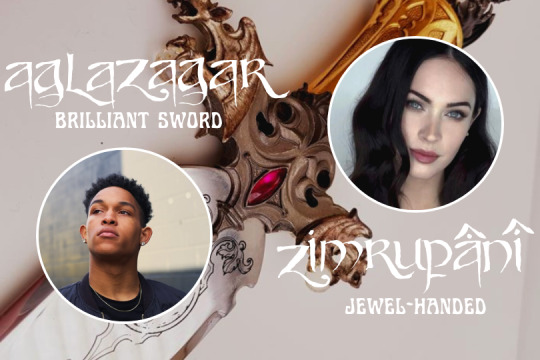


men of middle-earth ☀ misc. dúnedain ☀ headcanon disclaimer
Asdihil was the sixteenth Prince of Dol Amroth. He wed Lady Lômihirî of Lossarnach, who bore him four children: a son, Aglazôr, two daughters, Rûkhilî and Karasindil, and another son, Imrahad. In his ninetieth year, Asdihil and his sons were called upon by Steward Beregond to defend the White Mountains, where orcs fleeing their war with the dwarves had recently established themselves. Asdihil led a valiant attack, flushing many orcs out of the dales, but was laid low by a poisoned arrow. Aglazôr and Imrahad carried him back to Dol Amroth where he died surrounded by his family.
Grieving the loss of her beloved husband, Lômihirî found she could no longer bear the sight of the sea and removed herself to the land of her birth. With her were her two youngest children, Karasindil and Imrahad, though Aglazôr took up his inheritance with the aid of his sister Rûkhilî and his wife Gimilzâirî, both wise counselors. In Lossarnach, Imrahad found love and happiness with the maiden Azrurôth, who had never before seen the sea whose name she bore. Imrahad was glad to bring her to his home and wed her in his brother’s castle, though after their marriage they returned to Lossarnach to raise their children.
The eldest of these was Nilûzôr, a man of great cheer and confidence who expressed his true self at a young age by refusing the title of “little lady.” Nilûzôr wed the mason Ûrîbatân, a quiet and gentle soul, and bore him one child, a daughter by the name of Minluphêl. She became a scholar, often visiting the libraries of Minas Tirith and Dol Amroth, where she befriended her cousin Prince Aglahad and married one of his retainers, Abralêth, who returned home with her to Lossarnach.
Minluphêl and Abralêth’s son Aglazagar was, despite his fearsome name, a man devoted more to cultivating the beautiful flowers and orchards of his home than he was to war. Still, he took up his sword when the need arose, and for his valiance in battle defending the new outpost of Henneth Annûn, Steward Turgon named him the Lord of Lossarnach, now a fiefdom in its own right. Aglazagar wed Zimrupânî, a handmaiden of Turgon’s wife Mírdholen, and together they had two children: Arnubên and Morwen.
Arnubên was in many ways unlike his father, delighting in contests of strength and eagerly meeting Gondor’s foes in battle. His husband Hiruzîr was no less valiant, and the only thing that took him from the field was the birth and rearing of his son Forlong, raised by his fathers to be a mighty warrior. Arnubên’s sister Morwen was an iron-willed woman with an interest in politics. She often visited Minas Tirith, and it was during her residency there that she met Prince Thengel of Rohan, an honorable young lord whom she quickly grew to admire. In time they were wed, and when Thengel was called back to Rohan upon the death of his father Fengel, Morwen returned with him as his Queen. The Rohirrim loved their Gondorian queen, naming her Steelsheen for her grace and pride, and from her line sprung many of the greatest heroes of the Riddermark.
#tolkienedit#oc asdihil#oc lomihiri#oc aglazor#oc rukhili#oc karasindil#oc imrahad#oc azruroth#oc niluzor#oc uribatan#oc minluphel#oc abraleth#oc aglazagar#oc zimrupani#oc arnuben#morwen steelsheen#oc hiruzir#forlong#my edit#headcanons#tefain nin
22 notes
·
View notes
Photo


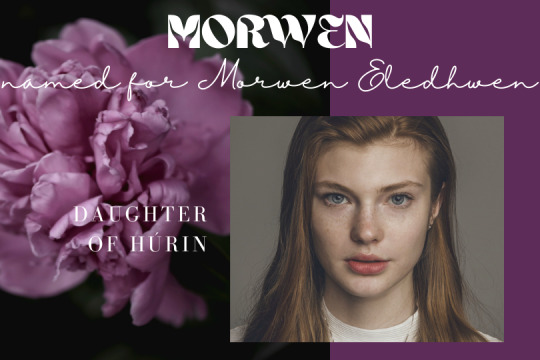
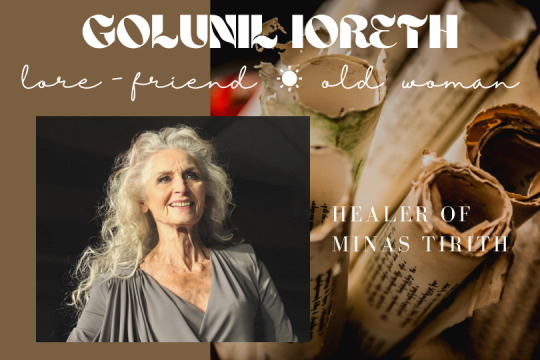


men of middle-earth ☀ misc. dúnedain ☀ headcanon disclaimer
Húrin the Tall was the Warden of the Keys of Minas Tirith at the time of the War of the Ring. Alongside Forlong, Hirluin, and Imrahil, he rode to the aid of the Rohirrim in the Battle of the Pelennor Fields, and when the Captains of the West marched on the Black Gate he remained in Gondor. When King Elessar returned victorious, it was Húrin who opened the barricade of the gatehouse to make way for the new King.
The husband of Húrin was Suilor, the Warden of the Houses of Healing in Minas Tirith. He was fascinated by herbs and herb-lore and tended to ramble on on these topics of his interest, much to the irritation of certain of his patients! Despite his enthusiasm for lore, Suilor was ignorant of certain important topics; it was not him, but his aged colleague Golunil, known by all as Ioreth for her advanced age, who remembered the old adage that The hands of the King are the hands of a healer. Hearing this wisdom, Mithrandir brought Aragorn to the Houses of Healing to tend to the sick, and both Ioreth and Suilor were able to bear witness to his miraculous healing of Faramir and Éowyn using the so-called “weed,” athelas.
Another of Aragorn’s patients was the soldier Ingold, who manned the north-gate of Forannest. When an army out of the east crossed the River Anduin, Ingold had been forced into retreat, bringing the grim news that the Rohirrim were blocked from riding to their aid. Yet Rohan’s warriors found their way to the battle nonetheless, and their timely coming saved Ingold’s life in the Battle of the Pelennor Fields, though he was not spared all injury. With the King’s careful healing, Ingold was brought back from the brink of death and was able to reunite with his brother Targon, a storehouse worker who had played his small part in the War by giving food to Beregond and Peregrin Took some days earlier.
Suilor and Húrin had one daughter, an adopted orphan they named Morwen after the wife of Húrin’s namesake. She aided her father in the Houses of Healing, where she briefly flirted with Lady Éowyn’s brother Éomer. Morwen was well-regarded by Lothíriel of Dol Amroth, and her high opinion of the Rohirric king influenced her friend’s decision to give Éomer a chance when he began to court her. Morwen attended Lothíriel and Éomer’s wedding, and shortly thereafter moved to Meduseld as her lady’s handmaid, where she found true love with Idis, a lady of Rohan’s court.
#tolkienedit#oneringnet#lotr#gondor#minas tirith#hurin the tall#oc suilor#warden of the houses of healing#morwen huriniel#ioreth#golunil ioreth#ingold#targon#my edit#my writing#edit writing#headcanons#tefain nin#men of middle earth#misc dunedain
25 notes
·
View notes
Photo


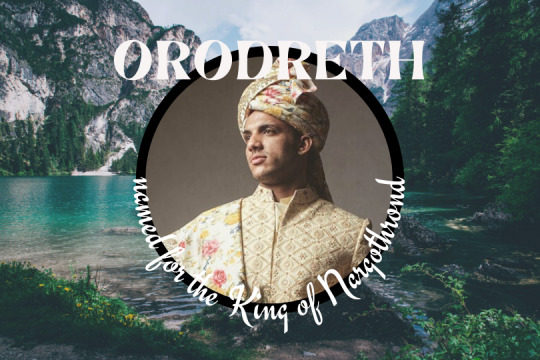

the line of elros ❖ stewards of gondor ❖ headcanon disclaimer
Belecthor I was the son of Húrin II, and was the fifteenth Ruling Steward of Gondor. During his rule, the Corsairs of Umbar once more threatened Gondor, and he spent much time and resources defending the coasts. Though the Corsairs were not defeated, Gondor managed to lock them in stalemate for many years.
The wife of Belecthor was Glóredhel, a charming woman who kept cheer throughout Minas Tirith even while her husband was away fighting pirates. She threw many large parties to distract the worried public, and became well-beloved by her people.
Glóredhel bore Belecthor two children: a son, Orodreth, and a daughter, Morwen.
#tolkienedit#oneringnet#silm#silmarillion#lotr#gondor#belecthor i#belecthor i's wife#oc gloredhel of gondor#orodreth of gondor#morwen of gondor#my edit#my writing#edit writing#headcanons#tefain nin#line of elros#stewards of gondor#finally a short caption...................
48 notes
·
View notes
Photo



the line of elros ❖ stewards of gondor ❖ headcanon disclaimer
Orodreth was the son of Belecthor I, and the sixteenth Ruling Steward of Gondor. Conscious of his father’s efforts to protect Gondor from the Corsairs, Orodreth spent his rule fortifying the nation’s borders and keeping their enemies at bay. His wife was Beleth, the daughter of one of his generals, whom he wed to win the trust of the armies. Beleth was fascinated by jewelry, and though she was not herself a jewelsmith, she frequently designed necklaces and rings for the craftsmen of Minas Tirith to make for her and her friends.
The son of Beleth and Orodreth was Ecthelion I, who succeeded his father and continued his work of building up Gondor’s defenses. Near the end of his life, Ecthelion rebuilt the White Tower of Minas Tirith first constructed by King Calimehtar, repairing it and raising it to greater heights. He was aided in this effort by his friend Prince Rûkhir, whom he envied for the freedom to love as he wished in the much more accepting coastal fief of Dol Amroth. Ecthelion himself never took a wife, for his desires were turned to men, and as Steward in Minas Tirith he was not so fortunate as to be able to take a husband like Rûkhir did with the warrior Batânaglar.
As he had no children, Ecthelion was succeeded by his cousin Egalmoth, the grandson of his father’s sister Morwen and likewise named for a Lord of Gondolin.
#tolkienedit#oneringnet#silm#silmarillion#lotr#gondor#orodreth of gondor#orodreth of gondor's wife#oc beleth of gondor#ecthelion i#my edit#my writing#edit writing#headcanons#tefain nin#line of elros#stewards of gondor
34 notes
·
View notes
Text
One of the interesting things about Théoden’s restriction on entry of any non-Gondorian who doesn’t speak the language of the Mark (assuming I recall it correctly) is that he is probably not a native speaker, himself.
Before Théoden was born, his father Thengel noped out of Rohan, went to serve the Steward in Gondor, married a high-born Gondorian lady, and had three children there, including Théoden. Thengel only reluctantly returned to Rohan when the Rohirrim summoned him to take up the crown. (We don’t know what Morwen, Théoden’s mother, thought about it, but she was the one who had to leave her homeland for a place where her husband didn’t want to go even to be king.) Théoden would have spent his early years with Westron and Sindarin around him, not Markish (or whatever they call it).
It’s possible that Thengel saw to it that his elder daughters and Théoden were taught the language of the place they would one day return to, but not at all certain. We know that Thengel insisted on “the speech of Gondor” being used in his house as King of Rohan, which seems a frankly extraordinary thing to do (linguistic use is very politically loaded! especially in Middle-earth!). If he insisted on the use of Westron or Sindarin in Meduseld, it doesn’t really seem likely to me that he’d have used Markish in Gondor.
Théoden was still a small child when the family went to Rohan (he had two more sisters born in Rohan, including his beloved Théodwyn, Éomer and Éowyn’s mother). He would have learned Markish once there, certainly, and it was presumably the younger girls’ native language. It’s not that he doesn’t speak it himself! But it is interesting that the language that he himself would have had to learn becomes the marker of who authentically belongs in the Mark.
Of course, this policy is partly (perhaps mostly) due to Gríma’s influence. But nevertheless, Théoden is so much King of Rohan, in many ways an embodiment of the Rohirrim in the wider narrative, and his court seems deeply rooted in the culture of the Mark in marked contrast to Thengel’s.
And yet Théoden was born in Gondor to a Gondorian Dúnadan and a prince who assimilates into Gondorian culture to such a degree that he doesn’t want to be king of his own people. I just ... wonder about what Théoden even thought of the whole situation, and what led to the choices he made about how he would rule Rohan, and how it impacted his relationship with, say, Rohan-born Théodwyn and the upbringing of her children as well as his own.
#anghraine babbles#théoden#thengel#rohan#legendarium blogging#ondonórë blogging#i do wonder about the impact on éowyn specifically bc she's kind of the opposite#she's also tightly linked to rohan/her identity as lady/shieldmaiden of rohan in the body of lotr#but the appendix tries to suggest she's a gondorian type and of course she ends up as a gondorian lady#i'm very meh on the former and think the gondorization of rohan is ... uh. problematic. but it is there and it's intriguing#and could play into both the faramir/éowyn and lothíriel-éomer dynamics in interesting ways!#but yeah#thengel's and morwen's legacy is one of the things we know very little about it but is kind of endlessly fascinating to me#anghraine's meta
72 notes
·
View notes